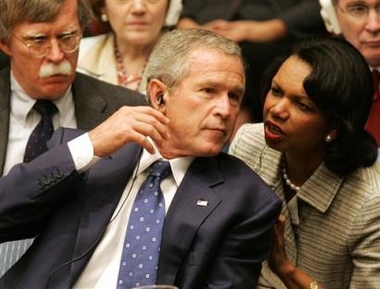|
US threatens North Korea with assets freeze
(Reuters)
Updated: 2005-09-16 15:52
FRIDAY KEY
Japan said Friday could be key.
"I believe today will be a trial day," Japan's chief delegate, Kenichiro Sasae, told reporters. "It is important that North Korea reconsider its position over the issue of a light-water reactor."
North Korea defended its position, saying it was demanding something specific.
"All the countries have expressed understanding of our position, but only the United States is adamantly against it," a spokesman for the North Korean delegation said.
South Korea has said it would not be opposed in principle to Pyongyang having a civilian atomic energy program in future.
Japan's Kyodo news agency quoted sources at the talks as saying North Korea had indicated it will "keep boosting production" of nuclear weapons if it were not given a light-water nuclear reactor.

US President Bush turns to Condoleezza Rice, U.S. Secretary of State, during a Security Council meeting at the 2005 World Summit at the United Nations Wednesday, Sept. 14, 2005. At left is John Bolton, U.S. Ambassador to the U.N. [AP] |
North Korea told the U.S. and Japanese delegations that "as long as our concerns about the light-water reactors are not fulfilled, we cannot abandon nuclear weapons," Kyodo quoted the sources as saying.
North Korea also indicated it was proceeding with the processing of spent fuel rods into plutonium, Kyodo said.
U.S. intelligence estimates that Pyongyang has already produced enough bomb-grade plutonium fuel from a five-megawatt reactor at Yongbyon to make nine or more nuclear weapons.
Washington, which once branded North Korea as part of an "axis of evil" along with Iran and Saddam Hussein's Iraq, says Pyongyang must end all nuclear programs verifiably and irreversibly.
It says the North can then expect aid and security guarantees. Pyongyang wants the aid and guarantees first.
South Korean President Roh Moo-hyun, taking a softer line, said on Thursday the United States should consider normalizing relations with North Korea.
"Any settlement that purports to be fundamental needs to embrace the normalization of relations between the U.S. and North Korea," he said in New York.
|